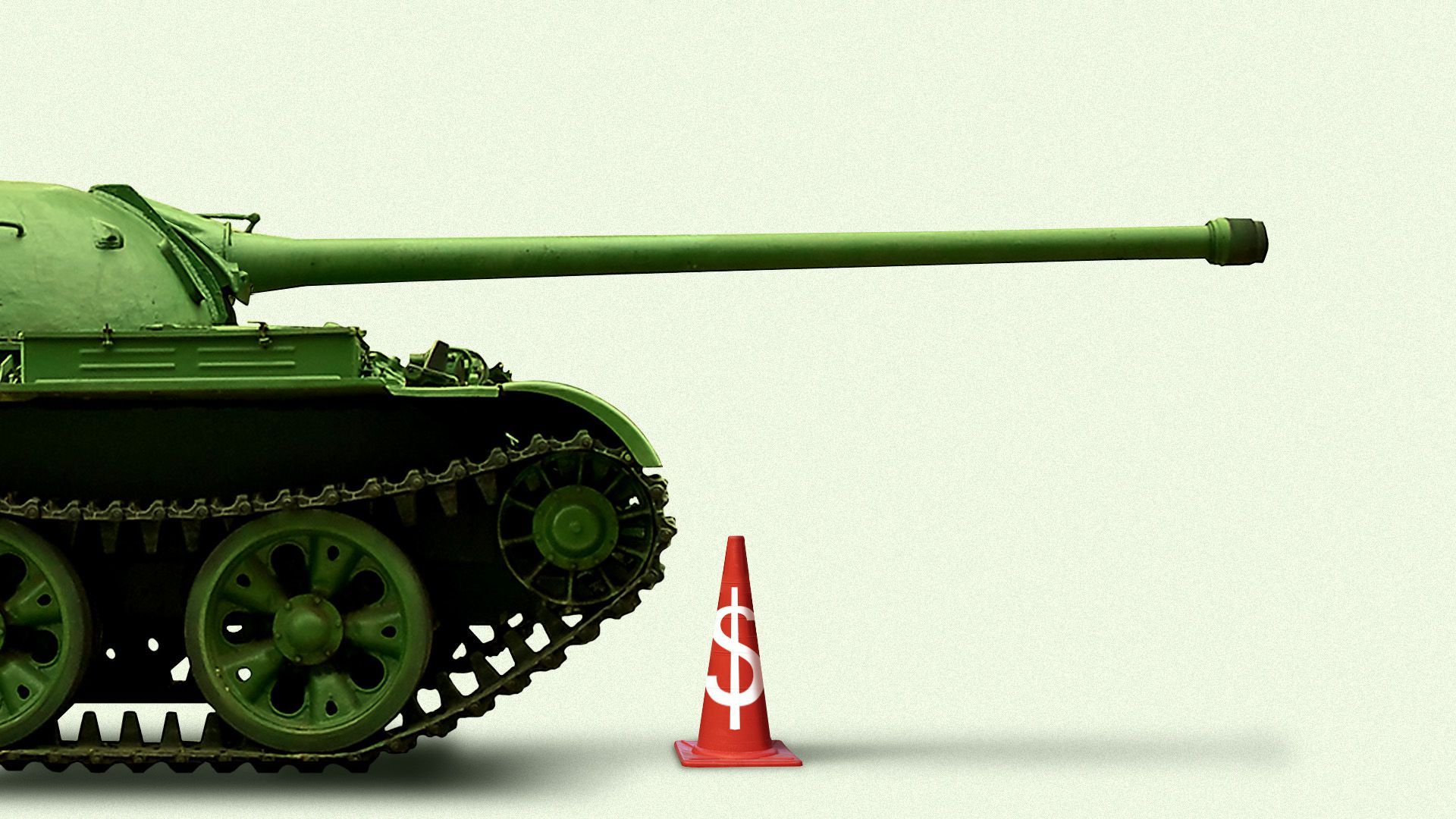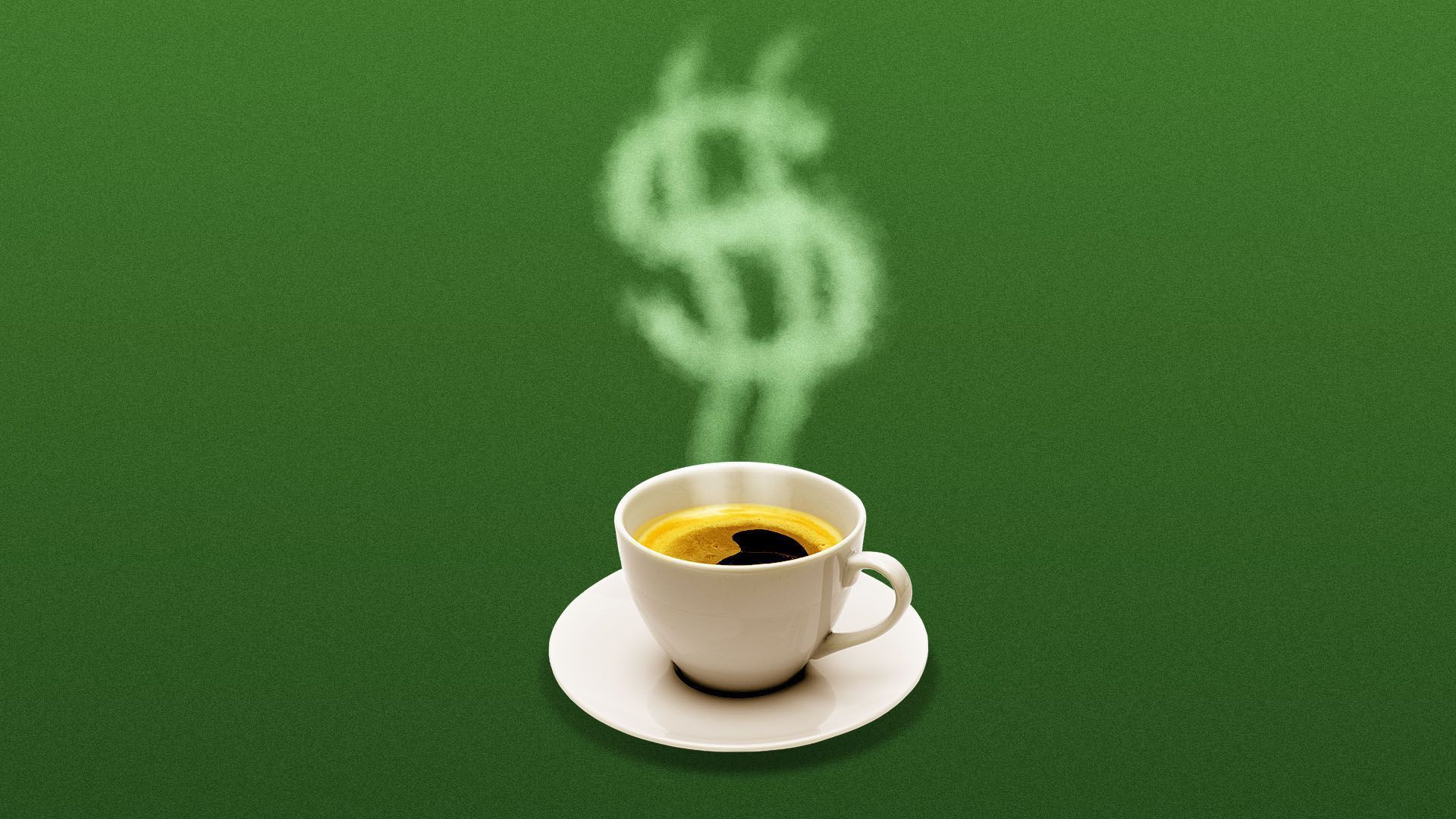| | | | | | | | | | | Axios Markets | | By Emily Peck and Matt Phillips ·Mar 16, 2022 | | ⏰ Emily here. Yesterday I complained about adjusting to the time change, later on, the Senate voted unanimously to make daylight saving time permanent. How's that for influential newsletters? (Scroll to the end for more on this.) I joke. Later today, the true economic influencers over at the Federal Reserve are meeting. Expect a rate hike announcement — the first since the pandemic era — at this afternoon's press conference. Today's newsletter is 1,058 words, 4 minutes. | | | | | | 1 big thing: Russia tests the West's favorite weapon |  | | | Illustration: Sarah Grillo/Axios | | | | The unprecedented sanctions the West imposed on Russia have hobbled its economy and are hurting the global system, too. But their primary purpose, arguably, is to stop the fighting. And that's not yet happening, Emily writes. Why it matters: Sanctions are increasingly one of the go-to tools in American foreign policy, all over the world — that doesn't mean they always work. - "Have sanctions given [Vladimir] Putin a powerful incentive to cut a deal? Yes. But is that incentive strong enough for Putin to actually end the war? That's doubtful," said Edward Fishman, a former sanctions policy official during the Obama administration and now a fellow at Columbia's Center on Global Energy Policy.
Driving the news: The EU imposed a fourth round of sanctions on Russia yesterday, prohibiting investments in the country's energy sector, adding more trade restrictions and oligarch punishments. Later in the day, the U.S. sanctioned 11 Russian military leaders; and Russia sanctioned President Biden, too. - "The aim of the sanctions is that President Putin stops this inhuman and senseless war," EU official Josep Borrell said in a statement.
How it works: Ideally, sanctions are a negotiation tool, part of a carrot-stick strategy that gets your opponent to the bargaining table. The best-known example of this working is in the negotiations by the U.S. leading up to the first Iran nuclear deal. But these measures serve other, less obvious purposes: - To express moral outrage. Some sanctions signal that certain behaviors are not tolerated and are outside established norms. Measured simply along these lines, the sanctions against Russia worked. Loads of companies, for example, "self-sanctioned," or pulled out of the country voluntarily.
- To inflict economic pain. This is part of getting Russia to the negotiating table, of course; to make it hard for the country to operate. That's happening. Russia is at risk of defaulting on its bond payments, the ruble is shot, the stock market is still closed, etc, etc.
Yes, but: The point really is to stop the bad behavior. And as any parent knows, punishments often backfire — they just create resentment and distrust. - Sanctions have been "effective" as a tool only about a third of the time in the 20th century, according to Nicholas Mulder, author of a new, well-timed book on the history of sanctions.
- Often, they fuel animosity, strengthening the resolve of the target country.
- They also inflict horrendous damage on a country's population, leading to starvation in extreme cases — punishing those most likely to dissent.
The bottom line: Short of going to war with devastating consequences —something President Biden ruled out — sanctions are the "least worst of very bad options the U.S. now faces," said Elena Chachko, a fellow at Harvard Law School who's written extensively about this strategy. Go deeper. |     | | | | | | 2. Catch up quick | | ⚠️ Nickel trading was suspended again today shortly after it reopened on the London Metal Exchange. (Reuters) 🚀 Citadel Securities made $7 billion in revenue last year and wants to open up about it. (Bloomberg) 📉 BuzzFeed employees sued the company alleging that its botched IPO cost them millions. (Axios) |     | | | | | | 3. China moves to calm market turmoil |  Source: ICE BofA Asian Dollar High Yield Corporate China Issuers Index; Chart: Axios Visuals The Chinese government has swooped in to prop up the country's flailing markets, Axios' Kate Marino writes. Driving the news: A top economic official said today the government would take action to boost the economy, and that it would introduce policies that are favorable to the market, the FT reports. The big picture: China sits at the center of today's geopolitical and economic uncertainty. Investors were fleeing the country's assets this week, as we wrote about yesterday. - New COVID lockdowns across the country threaten its growth — which in turn threatens global growth because the Chinese market is the world's largest customer. The lockdowns also imperil supply chains for things from tech to consumer goods.
- China's alliance with Russia has also put it at risk of becoming embroiled in President Vladimir Putin's conquest of Ukraine, Bloomberg notes.
- Investors were also worried about renewed government clampdowns on homegrown tech giants.
The impact: Hong Kong's Hang Seng Index is having its best day since 2008, rising more than 9%, while a tech subindex jumped 22%, the FT reports. Between the lines: It wasn't just stocks that were tumbling. China's high yield bonds were especially vulnerable to a selloff. They're largely issued by property developers — who've been plagued with widespread distress, and even defaults, since last year. - Prices for those bonds were sinking ever since Russia invaded Ukraine — sending yields to their highest point yet.
|     | | | | | | A message from Axios | | Exclusive reporting for pros in VC, PE and M&A | | |  | | | | Axios Pro: Deals gives you deeper news and analysis on everything transforming the investment world. - If you care about Fintech, Health Tech, Retail, Media or Climate, then Axios Pro is for you.
Try it free, or inquire about corporate subscriptions. | | | | | | 4. Germans are worried |  Data: FactSet; Chart: Axios Visuals The German economy is at the epicenter of the Russian energy shock, and expectations for growth are collapsing, Matt writes. Why it matters: With the world's fourth-largest gross domestic product, Germany's trade-dependent economy could be poised for a painful period of transition as the cornerstones of its model — free-flowing energy from Russia and strong demand from China — seem to be crumbling more every day. Driving the news: A closely watched index of economic sentiment in Germany produced by ZEW (Leibniz Centre for European Economic Research) dropped by the largest amount on record in March. - "A recession is becoming more and more likely. The war in Ukraine and the sanctions against Russia are significantly dampening the economic outlook for Germany," said Achim Wambach, president of ZEW.
|     | | |  | | | | If you like this newsletter, your friends may, too! Refer your friends and get free Axios swag when they sign up. | | | | | | | | 5. Grim M&A financing scene |  | | | Illustration: Sarah Grillo/Axios | | | | An early warning sign of trouble in deal-making land popped up this week. - Treehouse Foods, a packaged foods maker under pressure from an activist shareholder to sell itself, said that it won't pursue a sale after all — because the macro environment and financing markets have changed significantly, Axios' Michael Flaherty writes.
Why it matters: It's the latest example of the jitters rippling into the market thanks to persistently high inflation, the upcoming Fed tightening, and the war in Ukraine. State of play: It's a bad time to finance an acquisition. The comments point to a growing issue facing deal makers — banks are sitting on loans they can't sell to investors. - Bankers have committed to funding tens of billions worth of buyout deals in the U.S. and Europe, but investor demand for the debt has weakened over the last few months, as Bloomberg reported.
The bottom line: The era of cheap and abundant financing is coming to an end. Go deeper. To read more deal news about the retail and related industries, sign up for Axios Pro to get our newsletter, delivered Monday through Friday mornings. |     | | | | | | A message from Axios | | Exclusive reporting for pros in VC, PE and M&A | | |  | | | | Axios Pro: Deals gives you deeper news and analysis on everything transforming the investment world. - If you care about Fintech, Health Tech, Retail, Media or Climate, then Axios Pro is for you.
Try it free, or inquire about corporate subscriptions. | | | | Not everyone is in favor of permanent daylight savings. Markets reader Hank Walker emailed about when the country briefly switched to permanent DST in the 1970s. - "There is a reason we don't have it anymore — everyone hated it, the sun didn't come up until halfway through my 8am PE class."
What do you think? Send your thoughts, memories of gym class and suggestions to markets@axios.com |  | It's called Smart Brevity®. Over 200 orgs use it — in a tool called Axios HQ — to drive productivity with clearer workplace communications. | | | | | | Axios thanks our partners for supporting our newsletters. If you're interested in advertising, learn more here.
Sponsorship has no influence on editorial content. Axios, 3100 Clarendon Blvd, Suite 1300, Arlington VA 22201 | | | You received this email because you signed up for newsletters from Axios.
Change your preferences or unsubscribe here. | | | Was this email forwarded to you?
Sign up now to get Axios in your inbox. | | | | Follow Axios on social media:    | | | | | |












No comments:
Post a Comment